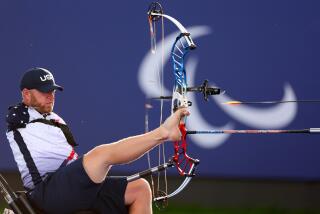The Valley’s Contribution to Goodwill : Sculler From Canoga Park Pulls Himself to Moscow Without Ivy League Training
- Share via
Greg Springer is a good sculler, which means he can row, row, row his boat speedily down a stream in a narrow vessel called a scull.
Greg Springer is also a son who never fails to amaze his mother.
Like when he phoned her from Indianapolis last week with news that he won the elite single scull category at the national trials.
“His mother went screaming to all the neighbors, ‘He won, he won,’ ” said the screamer herself, Barbara Springer of Canoga Park. “I don’t know if I’m more excited about this or when he made the Olympic team.”
The victory at the national trials qualified Springer, 25, for the Goodwill Games in Moscow. The Games start today and continue through July 20.
In addition to the single sculls event, other rowing events include the straight pair, the four-with-coxswain and the eight.
One of 15 rowers the United States is sending to the games, Springer lives in Newport Beach and grew up in Canoga Park. Although he won’t get a chance to compete until the games’ last day, he’s already preparing himself mentally.
“It’s a different feeling,” he said. “It’s hard to verbalize. There’s a lot of pride in it. That I’m on the U.S. team means a lot.”
Springer won the nationals over a field of 20 at Eagle Creek Reservoir last Saturday. In the final, he defeated Bob Reininger of Philadelphia by one second, which is about a half-scull length.
The win also qualified Springer for the national team and he will be in the World Rowing Championships next month in Nottingham, England.
Springer, who attended El Camino Real High, learned to row while attending UC Irvine from 1980 through 1983. Irvine is not exactly steeped in rowing tradition. The last five years, the NCAA single’s sculls champion has come from either Harvard or Yale.
“A lot of people assume that rowing is a sport dominated by the Ivy League schools,” Springer said. “But an athlete’s an athlete wherever you find him. To be at Harvard, you’re an overachiever to begin with. But that’s certainly nothing that can’t be overcome.”
Ivy League schools aren’t the only powers, however. “When I rowed on the varsity team,” Springer said, “we were fourth on the West Coast. It was Washington, Cal Berkeley, UCLA and us.”
Springer, the strength coach for Irvine’s rowing program since 1985, started his rowing career after leaving behind basketball and tennis, sports he played at El Camino Real.
“What happened was I had already decided to go to Irvine and I called the basketball coach and told him I was interested in trying out for the basketball team,” said the 6-5, 215-pound athlete. “I was walking down the athletics hall, and out of his office came this big guy, bigger than I was.
“He was the crew coach, Bob Newman. He asked me my age, my name and what my plans were. Since he was significantly larger than I was and I didn’t make the basketball team, I gave it a try.”
And the try has blossomed into the trip to Moscow.
Springer isn’t considering the political repercussions of his visit. He said he’ll block out thoughts of the Kremlin and White House, and focus his attention on one thing: the race.
“I’m going there to race,” Springer said. “I’ve got a race to do. Politics don’t matter. That’s just other people putting things--and I’ll take a chance here when I say it--things where they probably don’t belong.”
In the 1984 Olympics, Springer helped the United States win a silver medal in the four-with-coxswain event. That’s a race in which the coxswain sits in the back of the boat and calls out the rhythm of the oarsmen’s strokes.
In the same event at the Pan American Games, he helped the U.S. win a gold medal.
Springer flew to Dartmouth College in Hanover, N.H., last Monday for 10 days of specialized training on the Connecticut River, which borders Vermont.
His training is 90 minutes of rowing in the morning, 90 more in the evening and weight lifting four days a week. Rowing, he says, is demanding.
“Rowing uses a larger percentage of the total muscle mass, much greater than almost anything else,” Springers said. “I don’t remember the exact percentages, but think about it. When you’re running, you’re not using much of your upper body muscles. Or basketball, the same thing, you’re not using much of your upper body muscles constantly except when you’re slamming elbows with Akeem Olajuwon.”
More to Read
Go beyond the scoreboard
Get the latest on L.A.'s teams in the daily Sports Report newsletter.
You may occasionally receive promotional content from the Los Angeles Times.






